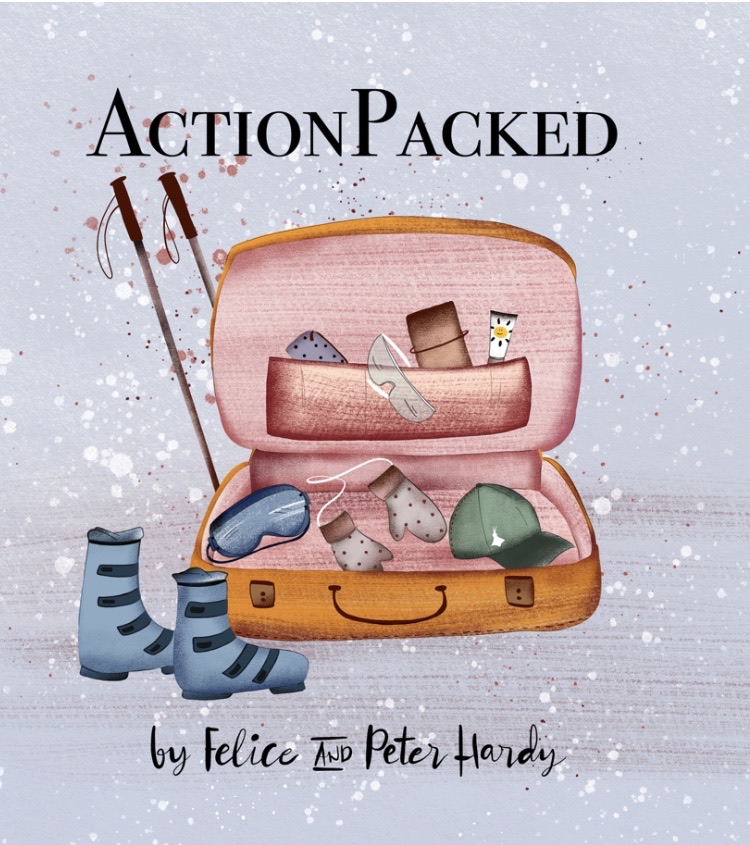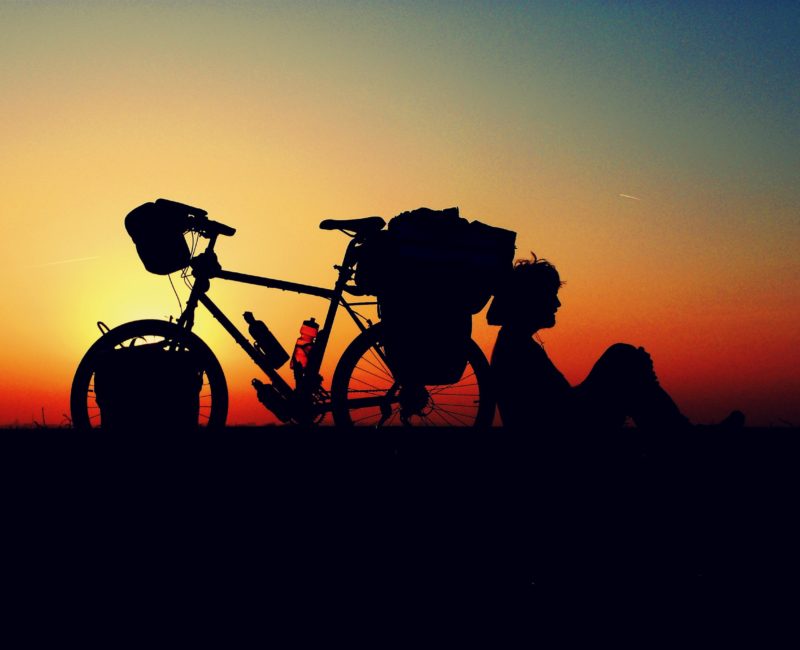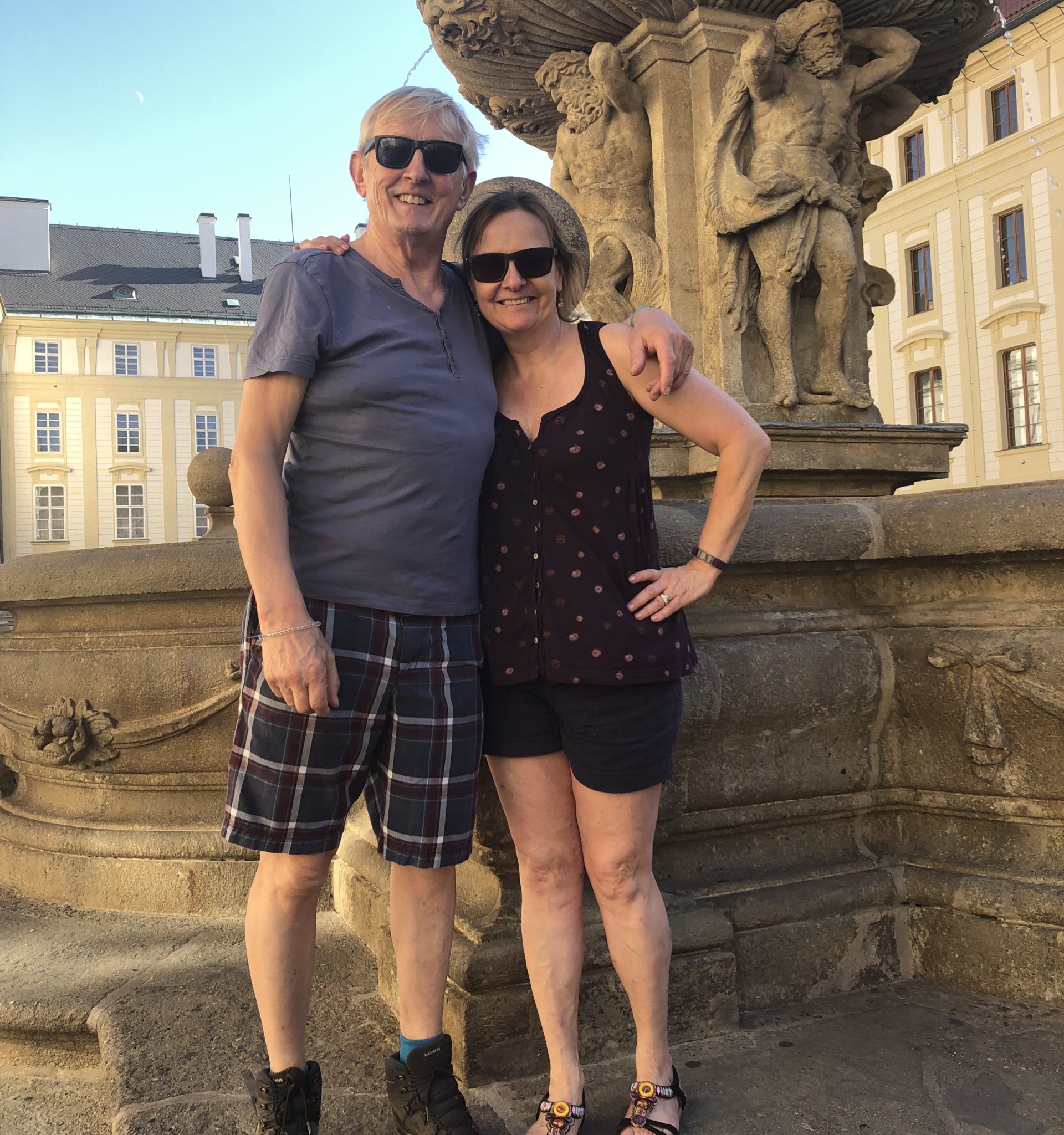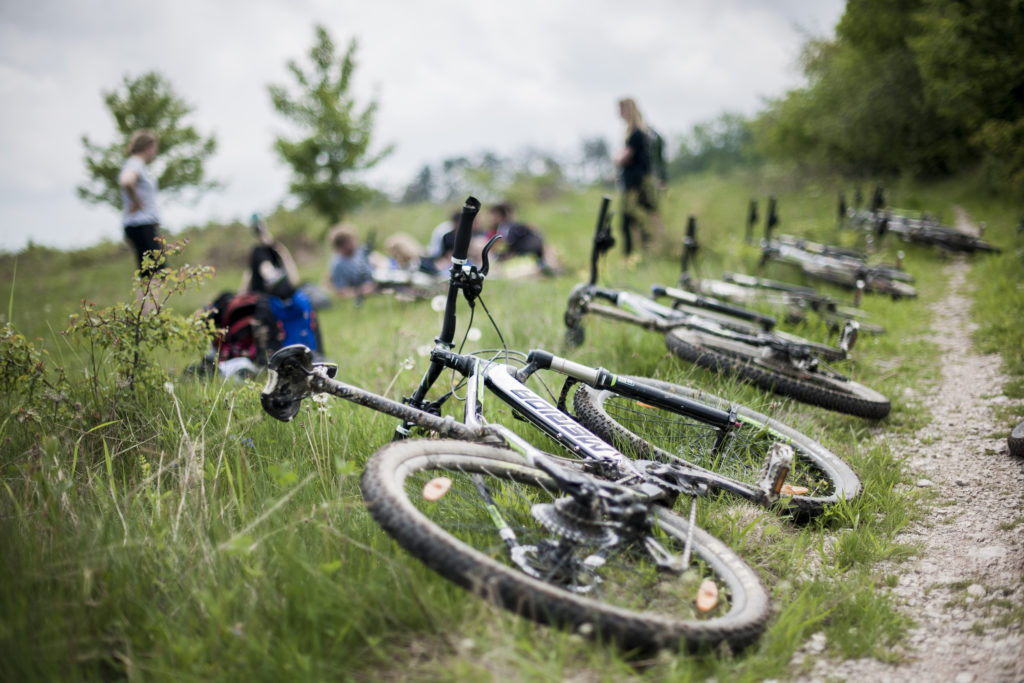
This week we’re celebrating English eccentricity at its very best and talking to cricket fan and self-styled slow cyclist, Oli Broom, who pedalled his way from London to Australia to watch the Ashes. Oli’s the very opposite of those sleek Lycra-clad figures who spend their weekends eating up as much tarmac as they can on super-expensive seven-kilo carbon-fibre racing bikes. When fully laden, his sturdy roadster weighed more than he did. ‘No rush…take your time,’ says Oli, ‘And enjoy the journey.’ These days he’s turned tour operator, taking fellow relaxed travellers on two-wheeled adventures through the hills of three contrastingly different holiday destinations, Transylvania, Greece and Rwanda.
Peter Oli, welcome to our travel podcast. Now it’s a long way by pedal power on an overladen bike from London to Brisbane. However did this extraordinary journey come about?
Oli First of all, thanks for having me on the show. And you’re right, it is a long way. I went for a bike ride at the weekend and it was 20 miles, and I wondered how on earth I got to Australia. So it came about because I think I was searching for a bit of meaning in life. I was working at an office, at a desk in London, and I felt that everything was a bit too easy and a bit just floating along. And I fancied a bit of an adventure, but didn’t really know what that adventure was. But I started reading quite a few travel books, but now I didn’t quite know where I wanted to go. I knew that I needed something to aim for though, because otherwise I’d just sort of head off into the back of beyond and never come back. So if I had a goal to aim for, I knew that would help me get out of my tent every morning.
So I was taking a wander with a friend of mine through a local neighbourhood in London and she was about to move to Sydney and she didn’t really know a lot about cricket, but had heard the word Ashes before. And when she mentioned the word Ashes, my brain started clicking into gear and I realised that the Ashes were starting in about 15 months’ time. So I quit my job, bought a bike and started cycling to Australia to watch the Ashes.
Felice So what did you take with you on your bike?
Oli I took a lot more than I needed and I can’t quite remember what the items I threw away were. But I know that my mum packed a lot of stuff sneakily into my panniers the night before I left, that I remember dumping a lot of it in Belgium and France in bins rather than littering the place. But anyway, I mean, it obviously depended where I was. I went through a lot of different climates and landscapes and that kind of thing. So in Europe, I was cycling through a winter European winter – October, November, December, January, carried a lot of warm clothes, always food to eat in the evenings when I arrived at my destination. A really warm Four Seasons sleeping bag. And when I got to hot countries I didn’t need as much kit.
Peter But above all, you had a cricket bat. Is that right?
Oli I did have a cricket bat. I actually carried seven cricket bats with me, one at a time. So they used to get sent out to me in various parts of the world by a cricket bat company manufacturer that sponsored part of the trip. And so I used to give it to people and I became friendly with cricket-loving folk in funny parts of the world like Serbia and Hungary and Turkey. And I think they were grateful for a new bat. And then I’d get a new one sent out.
And I used it as a chopping board as well for, you know, chopping onions and that kind of thing in the evening, and as a doorstop, a battering ram, all sorts of things throughout the year. Yes, of course I got a chance to practice my defence against a wall, because I had a tennis ball with me as well – Don Bradman-eque, I was practising for defence every now and again.
Peter the plan was to play cricket in every country you went to along the way. Is that right?
Oli Yes, it was, and I failed miserably. I go through 23 countries and I play cricket in 19 of them. Four countries I didn’t play in, and I can’t remember but I played cricket in 19. Some pretty unlikely spots as well – you know, I played cricket with a national team of Serbia, the national team of Hungary, the national team of Turkey and Bulgaria. And obviously I got a lot of cricket and when I cycled across India. So, yes, it was a kind of silly trip, really. I mean, the trip itself I found quite hard cycling and, you know, lots of different ways it was challenging. And the cricket always provided moments of levity.
Peter And you headed out of London and cycled across Kent to the coast. Then you caught a ferry to Dunkirk. And then what? Which way to Australia? I never recall ever seeing any sign posts.
Oli I used to ask locals. I used to have to find ways of amusing yourself to ask locals which way Australia was in the local language. I will always learnt that phrase in the local language. It got a bit harder when I got to Arabic-speaking countries and that kind of thing. But then, yes, I used to follow my nose. I mean, if I was heading southeast through Europe, it was generally a good thing. I used to follow the thin blue line on a map because I was pretty unfit, I didn’t do any training at all.
Felice What? None at all?
Oli Literally not a single piece. I did not go for a training bike ride. And about a year before I left, I cycled to Paris with a friend on a bike I bought on Gumtree or something for 20 quid. And she and I, we took eight days to get to Paris. It takes most people about three days, it took us eight days. You know, I suppose my assumption was if I could cycle to Paris, spend eight days in the saddle, then I could cycle halfway around the world. If there’s a problem on the horizon, I tend to bury it and then it either works out or it doesn’t.
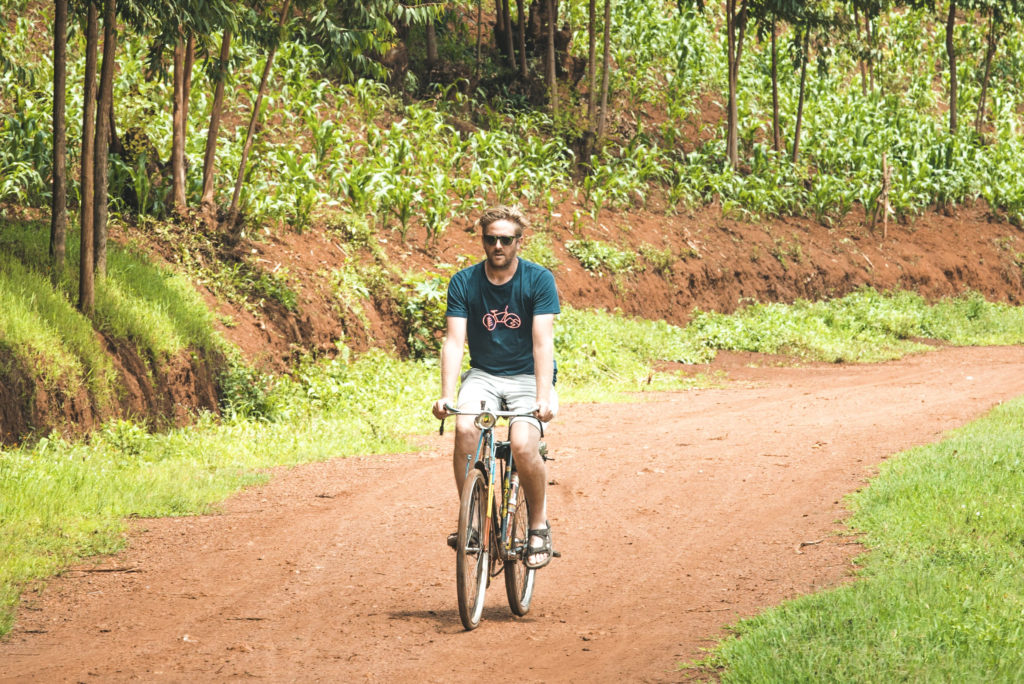
Oli cycling in Africa
It wasn’t a very good idea, of course, because at the end of day one, I was in tears. Also me and a few mates who cycled down from London, about 15 of us…I was in tears in a bunk bed somewhere in Kent because my knee was hurting so much and I was pretty, pretty terrified of not being able to do it. And she just said to me, she was a doctor, Kate. And she said: ‘Not all pain is bad, you know, sometimes your body is telling you something, but it will stop telling you that thing in a few weeks when you get your muscles going and that kind of thing.’ And she was right. About three weeks later, I had no more knee pain. And for the rest of the 14 months, I had absolutely no ailments at all.
Felice So what was your route you went? Turkey and then into Asia that way?
Oli So I went down through Europe and through Western Europe, obviously Eastern Europe and Southeast through Europe. And I hit Turkey and went round the Mediterranean and through Syria, Jordan, Egypt, Sudan. And then I flew to Sudan, to Mumbai and then across India and down through Southeast Asia. I got another flight from Dhaka to Chiang Mai because I spent about two weeks knocking on the door of the Burmese embassy in Dhaka and they wouldn’t even talk to me about getting me in. So then I cycled down through Thailand and Malaysia, and Indonesia and Australia and of course Australia, then across Australia – that’s stretching things – from Darwin to Brisbane. So that was about four and a half thousand kilometres.
Peter And then you actually got to watch some of the Ashes?
Oli Yes, I watched every day of the Ashes. And it was a triumphant series for England. We won the series 3: 1, which I believe was my prediction when I was on Test Match Special on at least one of the occasions during my trip. So I predicted it right.
Felice Do you have any bad experiences on your trip? Did anything go really wrong?
Oli Yes, things did go wrong. Things went wrong on a daily basis. Let’s say. I mean, things went right on a daily basis, too. There’s always something going wrong, whether it is like a dog chewing your tyre, you know, or we run out food. I suppose my big takeaway from the whole trip was that people are generally good guys like that in terms of sort of moments I felt in real danger. There were very few indeed.
I got I got pretty ill with dengue fever in Thailand. That was a real low and I genuinely didn’t know if I would be able to finish the trip and certainly get to Australia in time for the Ashes.
There was a guy in Australia who threatened to run me over and it came pretty close. There was a moment I got got hit by a wing mirror in Bulgaria and sort of fell down this little escarpment. And I’ve still got footage of me sort of giving this tearful piece to camera. But, you know, they were just low points. I mean, there’s always someone hooting encouragements as you’re cycling. I can remember cycling over the hills outside of Sofia. People hooting their encouragement as I was cycling up this sort of big mountain. And, you know, those were fantastic moments. I’d say I had very few real low moments.
Felice Did you come across any tricky, difficult, experiences with wildlife?
Oli So one scary moment in Turkey was when I was cycling along and it was getting near dusk. I’ve been looking for a place to sleep for quite a while. Well, I looked up to the left and I saw some smoke coming out of a little hut on a sort of small escarpment. Probably about half a mile away. And then as I looked towards it, these shapes started running towards me. I was very soon to find out they were dogs, big sheepdog, kangal dogs, sort of waist high. I think anyway, they ran towards me, they fanned out. And they were following me.
I mean, if I looked behind me, there were six or seven of them all fanned out behind me and they were getting closer and closer. And I reached the top of a small incline. I looked behind me and they had stopped. They were probably about 100 metres behind me at this stage. And I didn’t count my chickens, I sort of waited for a bit and didn’t know why they’d stopped. Anyway, eventually I got back on the bike and started pedalling down the hill into this village, and I quickly realised why they’d stopped. It was because it was almost at the edge of their territory, and at the beginning of the next pack of dogs territory.
Anyway, these dog started running towards me from the village and they weren’t particularly aggressive in the end, but I ended up jumping off my bike, wheeling my bike about half a mile into town with these huge sheep dogs all around me, and pitched my tent in the village. They disappeared and I was in the middle of a village on a grass patch, the only grass patch I could find. It was kind of lightly snowing by the stage and it was very dark. And this chap came and said effectively – I didn’t understand what he’s saying – but effectively it was what the hell are you doing? And he ushered me towards the mosque and he was the imam. I found out he was the imam, but he assured me it was this sort of side bit of the mosque and he opened the gate and about a hundred turkeys… he ushered them out of this compound and then opened another door.
And there was a room and it was just full of blankets. And there was a big soba, a big sort of log burner or in the middle. And he ushered me to make my bed there. And then he disappeared. And I thought it was going to be a cold night because there’s no wood for the fire. But he came back laden with wood and left me there, made the fire and left me there. And the nicest, you know, the nicest finish to a day after that adrenalin rush of the dogs.
So the thing about the Australian outback is that there are so many dead kangaroos. I mean, it’s just unbelievable. So I cycled with a Hungarian friend for the last three weeks through the outback, and we reckoned that we saw a dead kangaroo every 10 metres. The outback really is that to me is the stench of death, because you know dead cows and dead all sorts of things, snakes and everything out there. And after I finished, I got the train across the Nullarbor Plain from I think it was from Melbourne or Adelaide across to Perth.
And, you know, you’re looking out of this vast expanse of nothing and it’s beautiful in its own way. But you can’t smell anything. You can’t feel the place. And I did, you know, although that smell of death wasn’t necessarily nice, at least it means you’re getting a sense of what the place is like, how inhospitable it is. And I remember that feeling sitting on the train thinking this is pretty rubbish, I’d rather be out there on a cycle, even if the wind is making me only be able to cycle five kilometres an hour.
Peter How much did your bike weight when fully laden?
Oli Well, at one point it was heavier than I was, at one point it was 69 kilos and I was 65 – that was in Sudan. And by the way, now I’m 90 kilos. And when I left, I think I was about 82 or 83, so I lost a lot of weight.
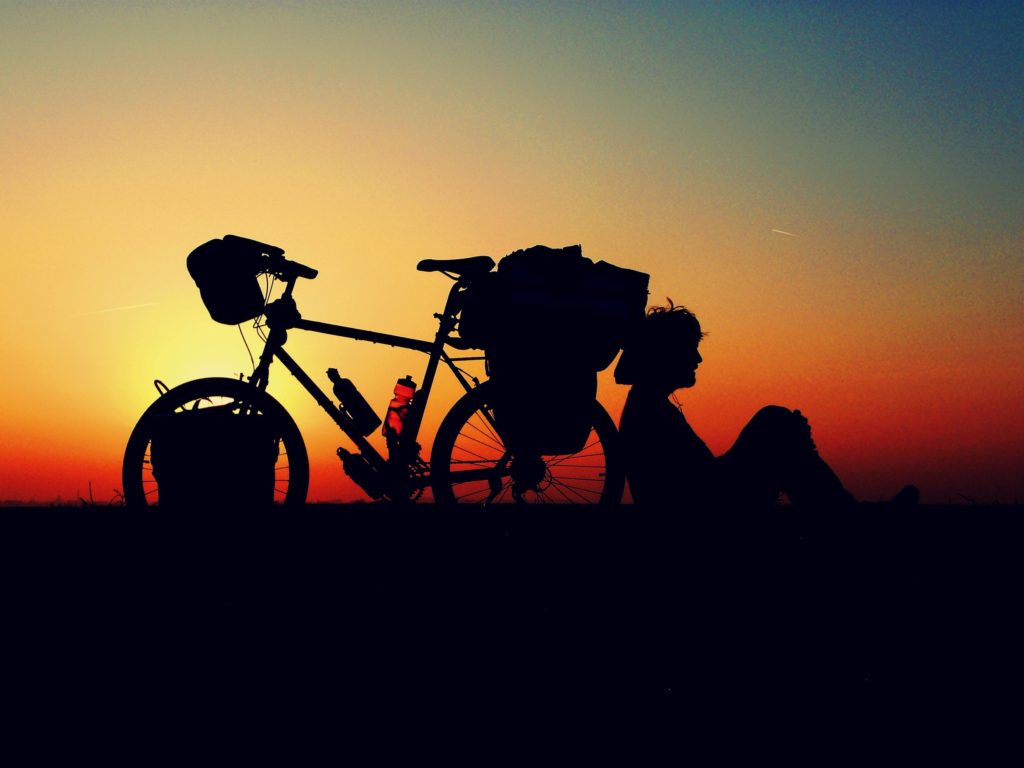
Peter And you took a lot of water. Presumably you took water?
Oli So a lot of that weight was water. I think when I weighed the bike it was on some scales getting onto a boat in Aswan, or getting off a boat in Wadi Halfa. I think it was in Sudan, my bike had probably something like 30 litres of water on it. So it was a lot. So water was always responsible for most of the weight.
Felice So do you follow roads all the time or did you go off-road as well?
Oli I went off-road a fair bit. I mean, one of the things about the type of cycle that I did, I suppose, on that trip, was that I was most of the time following main roads because I felt a slight urgency to crack on with things. And I suppose if I hadn’t set that goal of getting to Australia in time for the Ashes, I might have done more. Quite often I’d be cycling past a UNESCO site, but it was 50km off the main road, and so I think: my going to that’s another day, basically. So I still stick on the main road. There were times, though, when I did get off properly off the beaten track in Australia, for example, coming down the Stuart Highway from Darwin, the road trains were threatening to kill me. I mean, they were horrible – pushing me off into the dust occasionally. And if the wind was swirling different ways, they’d suck you in and it would feel like you’re going to hit them. So that wasn’t very nice.
So there I really I sort of headed east towards the Gulf of Carpentaria, headed down the Barkly Tableland, and you’re probably off the beaten track. That was a great moment where I was cycling along, I’d been pushing my bike through much of the day through sort of sand that was a good few inches thick, and was on my bike when this truck came up and they just stopped next to me. And the guy who was driving. He was in the front with two others. And it was a flatbed truck, and he just leaned across his mates and he said he said: ‘Your f***ing stupid bastard.’ And and he didn’t say anything else. He just got out of his truck and he jumped up onto his flatbed and he opened the freezer that was strapped down onto the back of a flatbed. And he hurled a frozen bottle of water.
I mean, almost as hard as he could at me and didn’t say anything else, just drove off. And that was sort of outback hospitality for you. The best thing was the next day, him and his mates came back and I was on the same road and they were coming back to that. It was a big gold mining area and I suspect that’s what they were doing. And he just was very quietly pulled up beside me, didn’t say a word., handed me another water bottle and we had a good chat, a nice chat rather than off the cuff, you know, hurling abuse at me.
I’d just cycled the last three weeks with a Hungarian friend that I made friends with in Budapest. He’d actually made a film about my whole trip and had said when I left Budapest that he wanted to come with me on the ride, but he just got engaged – sorry – just got married. Anyway, he flew out to Australia and cycled the last three weeks with me and we were cycling on Monday and this car came towards us. And as they went past these two girls waved and we got quite excited – hadn’t really seen any girls for a few weeks – I hadn’t anyway. And anyway, the next day, same car comes past a bit like the Australians spraying the water bottle at me. Same car comes past the other way, heading back towards the coast, same direction as us. So we ushered them just to stop when we chatted to them and one of them is called Naomi. Laci wanted to do some filming, so he jumped in the back of that car and filmed me as I was cycling along. So he did that and then they gave him a lift back to his bike, and then they drove off and then he was going to catch up on me.
But as they drove past me, Naomi got up to the roof of the car and took her top off and said: ‘We love you guys!’ That’s quite funny. It’s quite amusing. And then anyway, about three weeks later, I arrived in Brisbane at the Brisbane Cricket Ground and my mum was waiting there, and my dad had flown out from the UK. They’d both flown out from the UK. And my first ever cricket coach was there to welcome me. Standing next to my mum was Naomi the Flasher. I couldn’t believe it. She was literally chatting to my mum – I had no idea, I had not been in touch with her at all. It was just a very strange moment.
Felice Did you sleep in a tent in your tent every night?
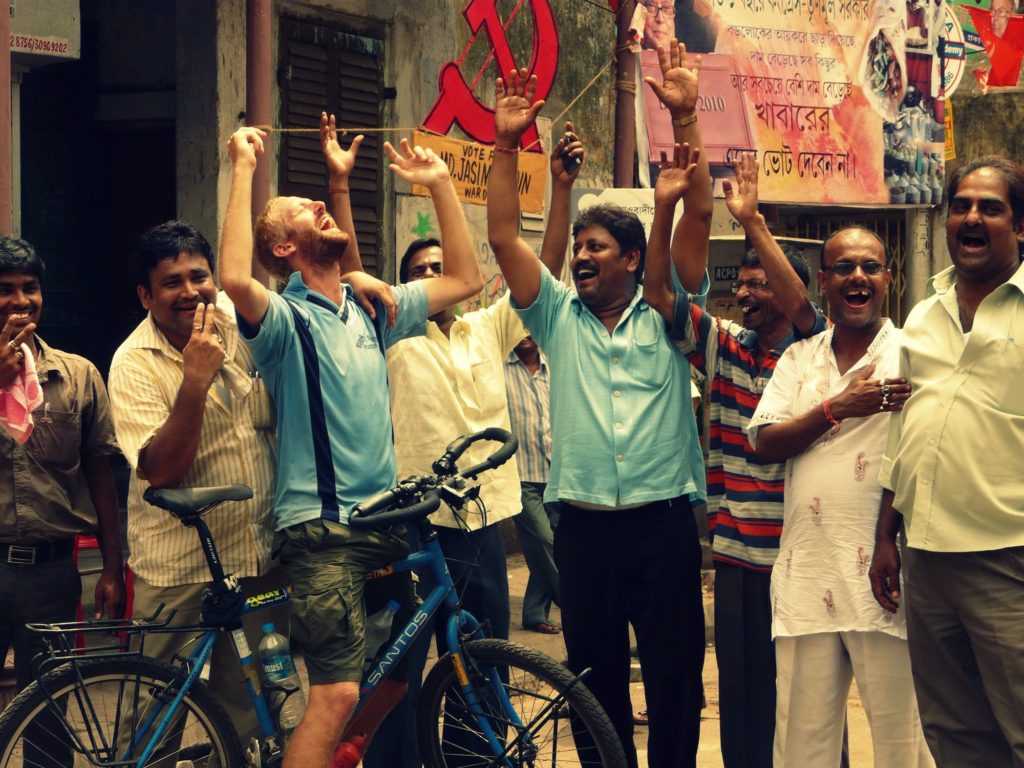
Oli in Calcutta
Oli No, absolutely not. I can’t come claim to have slept my tent every night. I did carry my tent all the way. I probably was on the road for 412 days – I probably camped about 200 times, because in somewhere like India I was there in April, May, and where it’s kind of 40 degrees during the daytime and not much cooler at night. And you’re paying one or two quid for it for a really cheap bed in a roadside dabha. So I did most camping just south of Calcutta on a beach right in the middle of the beach. hadn’t really seen anyone, I was fast asleep, heard this noise outside was actually the place, the zip of my tent opening. And I sort of woke up adjusted to the light. And there was this man.
I can’t remember his wording, but he essentially he told me he was a customs officer and that I should get off the beach. And as he was doing that, leaning through my tent, he reached into the top pocket of his shirt. He reached for a comb and he got it out and he brushed his hair and then and then carried on telling me that I should leave the beach. I will never forget that very strange situation anyway. So two in the morning, I had to pack up all my things and my tent and everything and cycle back off the beach. And I camped sort of under the edge of a temple, and I woke up at about four o’clock because, you know, everyone in the village was up and about and this family took me to their house for breakfast. I wasn’t very happy with the customs officer, but something good came of it.
Felice So did lots of people befriend you like that and take you to the house and things like that?
Oli Oh, yes, absolutely. The memory for me is spending time in people’s houses, shops and all sorts of places that they owned, particularly in Islamic countries I found there was just no concern that I wouldn’t find somewhere to sleep. Whereas in India it did always worry me. I cycled well into the night in India, quite often looking for somewhere to sleep.
But in an Islamic country, I was never worried because I just knew that I could even camp in the middle of nowhere, or if I was near people I would be taken in. I mean, it was as simple as that.
My first night in Syria, I’d just crossed the border from Turkey, I was cycling along and a pick-up truck pulled up behind me. And two men in black, full length black trench coats, got out the car and they introduced themselves to me. And one of them had just been working in Saudi Arabia for ten years, is a civil engineer. And he seemed like a nice guy. And he said to me: ‘You know where you are? Where are you staying tonight? Would you like to stay with my family?’ So I thought, yes why not?
So I followed them into town – about a mile into town. And then we went to a shop front and it turns out the shop was pretty much empty and their house was sort of behind, linked in. And I slept in the shop window in a busy town in northern Syria. But you know, I got taken around to lots of their friends’ houses. It’s really very sad to think what’s happened – that town, Ma’arrat al- Nu’man, I think it was in the early days of the Syrian conflict, it was right at the centre of things.
Peter During your journey to Australia, how many punctures?
Oli Well, I didn’t count my punctures, I’m afraid, but I can tell you when my first one was, it was in Turkey and it was caused by a dog. Amazingly, I got through the whole of Europe, pretty much the whole of Europe with not even a not even a puncture. And frankly, I can’t even remember a time when I to pump up my tyre. And then after that, certainly most weeks, if not on a daily basis. But I very rarely had to fix a puncture myself. It’s amazing how often you’ll near people cycling along, you know, around the world. So many times I would get a puncture and someone would grab it off me, take it to the local tyre repair shop and just fix it for me. I must’ve fixed about probably ten punctures myself, and I probably had about fifty in total.
Peter What did you do about washing clothes? How do you manage that?
Oli I didn’t bother washing. I think that was one of the things actually – my mum gave me was washing powder and I quickly got rid of it. I mean I had various people to stay with throughout Europe, for example people involved in cricket in various countries. I’d arranged to stay with friends or a friend-of-a-friend in Belgium so there were always people that I could…well, it sounds like I’m just a cheapskate, doesn’t it… people where I could use their washing machines, and so that’s what I did. I mean, I gave away quite a few clothes as well…that kind of thing.
Peter Going back to cricket: how did these various countries know you were coming? Austria and Serbia are not particularly well known for their cricketing profile worldwide. How did they know you were coming? And had you been on radio in England or something?
Oli So the people who organised cricket in these various countries across Europe, I had I had written them to introduce myself and say could I play cricket in that country. And they were all incredibly enthusiastic about me visiting them which I was really excited about it. I did find them enthusiastic when I arrived. But they had all been coerced into hosting me I later found out. Vladimir, the self-appointed general secretary of the Serbian Cricket Federation, told me, he admitted that he’d actually been forced into it. I think he felt like he was able to tell me because we actually became quite good mates. You know, 10 years later, we’re still in touch. So that’s how it happened, it was great. It was an extraordinary meeting Vladimir and Haris, probably two of the most enthusiastic, passionate cricket lovers I’ve ever met. And they are fully fledged Serbs and residents of Belgrade.
You know, no connection to the UK apart from Haris, worked here for a few years. You know, they love this game. You know, it’s just just extraordinary. And they had no cricket ground in Serbia. They do now. But at the time, they had no cricket grounds. So we played within the walls of this fortress, and the wicket was a path, a tarmac path. It was quite something.
Peter Having watched the ashes and seen victorious England, what happened then?
Oli After the ashes, I headed home and didn’t have clue what I wanted to do with the rest of my life. One of the purposes of going on the trip was to figure it all out. I probably hadn’t really, I sort of just had fun, just I did a lot of thinking, but I hadn’t really decided what I wanted to do with the rest of my life. And so I bunked down with various mates in London for about nine months and during the course of that nine months I managed to get a book deal, so it tide me over for a few months, writing a book.
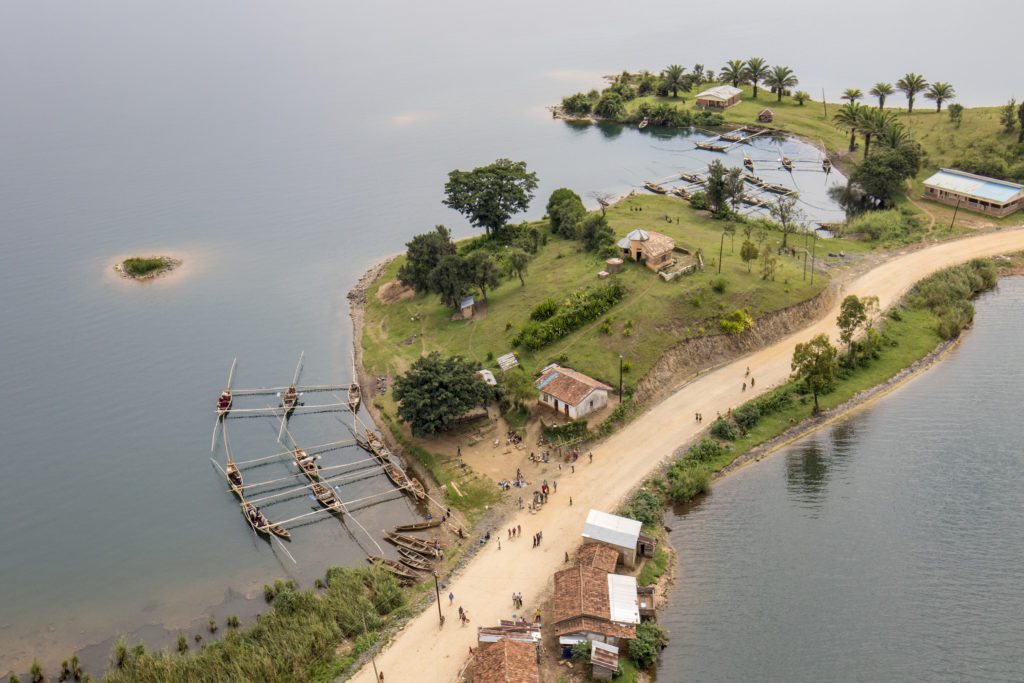
A village in Rwanda
And while that was happening, I found a job advert for this role in Rwanda. So I got this job out in Rwanda from a friend who perhaps knew I was searching for some meaning as well. And they knew that I loved cricket, it was a job to lead the project to build the first international standard cricket ground in Rwanda, which had been started by a guy who had very sadly died. And so I just thought: this sounds great fun, it sounds like a project. I looked into it a bit more. My first impression was – Rwanda and cricket? I’m not sure that sounds particularly necessary or required, but I dug into it and it did sound like a great project. So I moved out to Rwanda. I spent spent two years living out there. And the aim was to provide a home for the cricket community of Rwanda. It was pulling people in from all walks of life.
The story of cricket in Rwanda is a great one as well, because cricket was brought to Rwanda by the Rwandese. So not by the English, which in every other most other cricket-playing countries, certainly in Africa, was brought by the Brits, whereas in Rwanda it was introduced by Rwandans just a few years ago. So it’s a nice story.
Peter Having come back from Rwanda, you decided to set up a tour operation?
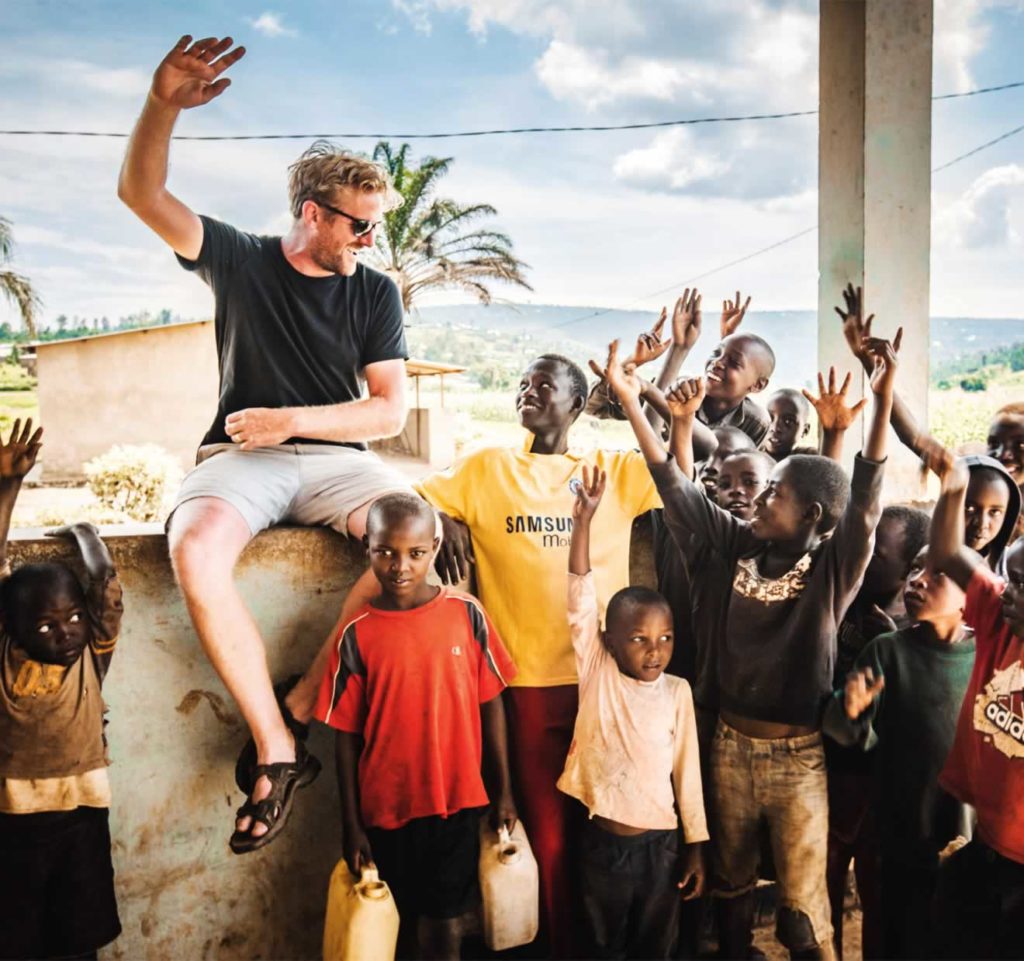
Oli with children in Rwanda
Oli I did fall in love with bicycle travel when I was on the road. I had done a lot of cycling in Rwanda, what I was living out there. And Rwanda was really a place that made me think this could be a great idea to take people on much shorter journeys, obviously, than my trip to Australia, but trying to get a to feel of uncovering places that are a bit different and perhaps not that visited. In 2015 I started welcoming people or taking people to Transylvania in Romania, and then we’ve grown from there.
Peter Why Transylvania at all? It’s more Dracula country than cyclist county.
Oli Yes, so it’s an interesting one. So I think the first reason, Transylvania, is because when I was cycling through Eastern Europe, everyone I spoke to or heard from back home was saying ‘you shouldn’t be cycling along the Danube, you should be cycling through Transylvania.’ I say to everyone, but this is not many people, but anyone who’d been to Transylvania. I’d always wanted to go there and then I was just chatting to a friend about the sort of place I was looking for for my cycling journeys in Europe. I wanted to take people on, and she’d just been walking there and had had an amazing time and described this place as being sort of a land lost in time, incredibly beautiful architecture, food that was the very definition of organic without being called organic, just somewhere in a bit of a time warp.
So I went and I found exactly the place that she described. I just thought this is the most magic place, if I’m honest, I’ve struggled ever since to find somewhere that matches it. I think we’ve done it now and we’ve sort of cracked it. I mean, I’d never been involved in travel, so I really threw myself in at the deep end and decided to run a few trips in 2015 and then decided it was a goer. And at the end of 2015, my wife and I decided that the following year we would go and live out there and so we’d get to know the place and also how to run a travel company. So we did. We went to live in a tiny village in the middle of nowhere. My wife was pregnant, so she spent most of her pregnancy out there. And it was great. And we sort of felt like, whenever people came to visit – or paying guests – that we were showing them our little corner of paradise. It was it was great.
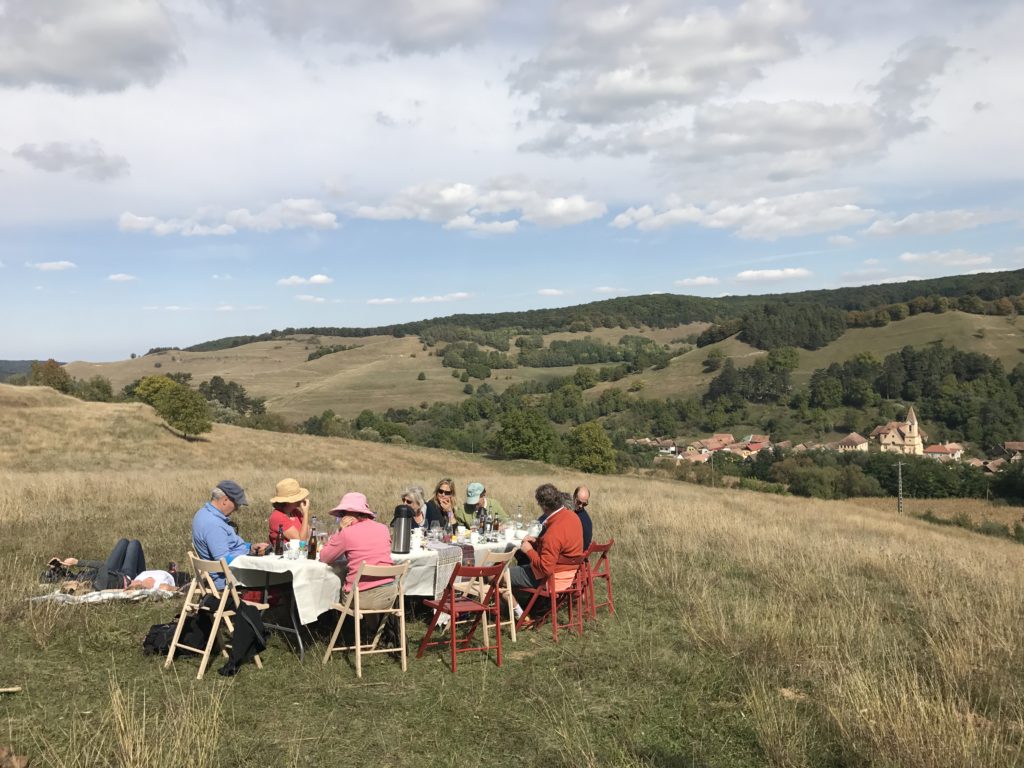
Lunch in a meadow, Transylvania
Peter Cycling for the guests is slow cycling essentially it is? Not turn up in your Lycra and see how far you can go each day?
Oli Yeah, it’s absolutely slow cycling. It’s a chance to unwind. I think most of my guests have pretty busy lives and it’s just a chance to sort of just mosey along on a bike. And we do a lot of walking as well. And it’s very much not Lycra. Travel at its best is an opportunity to make people think about their lives back home and what they want out of it. And I think the best way of doing that is just by slowing down and seeing new places, places that are particularly different.
Felice And that’s what we do to provide the bikes, or do people bring their own?
Oli Yeah, we provide everything. I don’t like the word package necessarily, but it is a package. These are definitely unrelated with people who perhaps have been independent travellers in the past, that kind of thing. But nowadays they really value a bit of comfort and well designed, well thought-through trips and not having to do too much either, because that’s what busy people, busy people who you just want everything provided. So we do that.
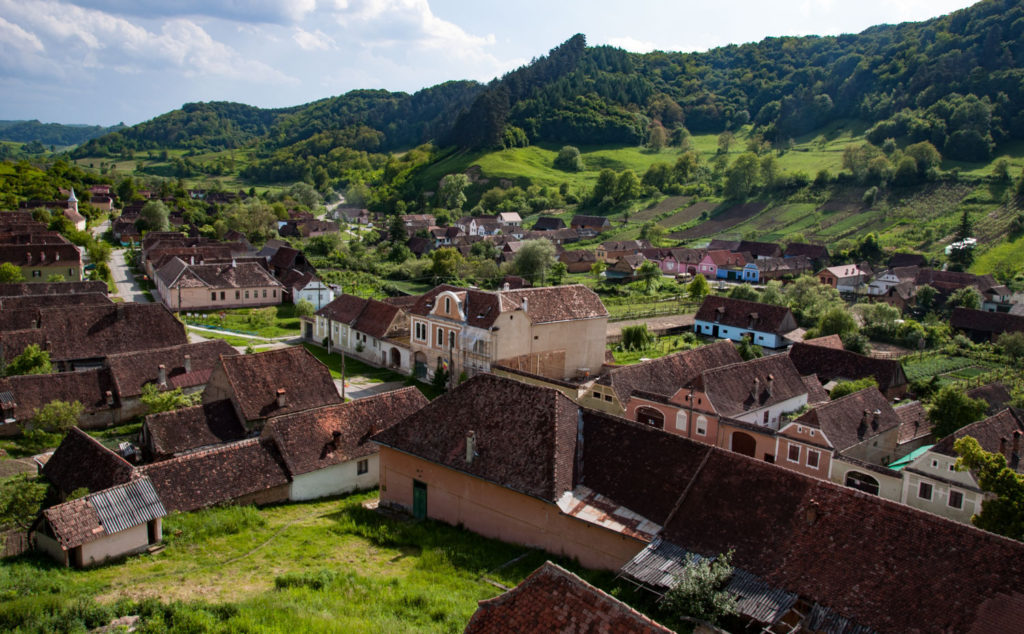
A village in Transylvania
Felice And do people have to book a whole group or can they join a group?
Oli They can join a group. So we the vast majority of our guests come as private groups of around six to twelve people. And then we run a limited number of scheduled trips each year that people can join as singles or twos or threes or fours.
Felice What if someone wants to come on an e-bike? Can they do that?
Oli Yes, absolutely. So about 60% of our guests these days use e-bikes. The growth of e-bikes has a great trend for us, and it’s sort of hit at the right time. And it just opens up new experiences to lots of our guests who wouldn’t necessarily be able to cycle up into the into the forests of Transylvania on a dirt path age 60, and they now can. So it’s been amazing.
Peter We are huge e-bike fans. We started doing this in Austria some years ago, then we came back and we bought our bikes and we came back to Austria, to France and it is really good fun.
Felice They’re quite useful in the Alps because it helps go uphill.
Oli Absolutely. I mean, lots of the most interesting places in the world are quite hilly. You know, when there’s a reason, we don’t do cycling trips. Well, where’s flat? They’re interesting places as well, and anywhere in the middle of the outback. And so you do need the extra push. But we do trips in the Land of a Thousand Hills, Rwanda, and I definitely opt for e-bike when I go there and it’s great. I mean, these trips are all about shared experiences, friendship, leaving a light footprint, travelling nice and slowly, really high quality of everything. And they’re great fun.
Peter So Rwanda, Transylvania and any other countries?
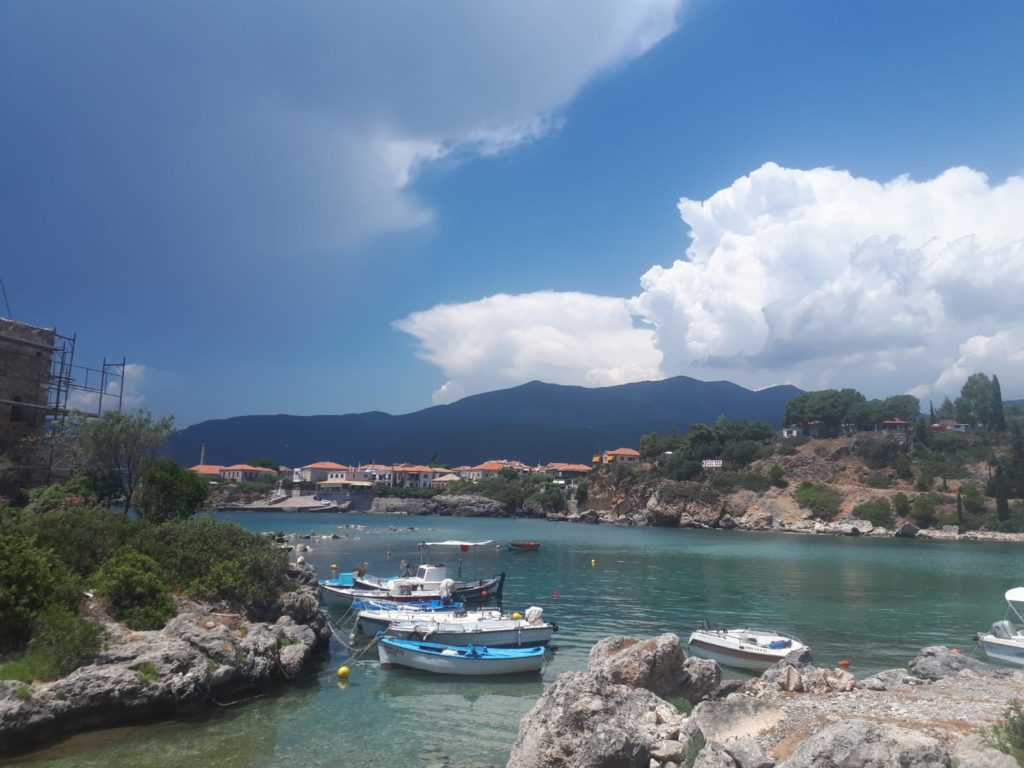
Mani peninsula
Oli We go to two parts of Greece. We started a couple of years ago going to Epirus in northwest Greece, Zagori in particular. And again, it’s a kind of a Greek version of Transylvania. I think it’s a very interesting part of world. It’s not as different as Transylvania, but it’s sort of got that feel. And then we go to the Mani peninsula in the Peloponnese as well, which is Patrick Leigh Fermor territory where he spent most of his life. That’s a slightly different model. Most of our experiences, we take people on our journeys from A to B. But in the Mani, we take over two very nice properties and we spend three nights in each.
Felice So what’s happens to people’s luggage? Is the luggage taken?
Oli Yeah, we take everyone’s luggage, absolutely.
Peter And what’s actually the age group your clients on the whole; is it people in their 20s?
Oli No. Most of my guests are older. Most of our guests are 40-plus, I would say, we’re not the cheap end of the spectrum, I suppose that rules out a fair few people, younger folks. I think that age groups of 40s, 50s, 60s really appreciate the little extra touches that we put into everything. There is a lot of detail. It’s all about the detail really, and they really appreciate that. So we seem to have found our niche there, in terms of the people who come. I think they tend to be people who just believe what we believe.
Peter And in recent months obviously it’s been very difficult?
Oli Yes it has been, to say the least. But firstly, I’m aware that it’s very tricky for a lot of people and so I always try to remind myself of that. But yes, it’s not easy having a travel company at the moment. I think the main reason is just the lack of clarity.
Peter So how do people book a holiday with you?
Oli Because you people tend to go online, look at our website. It’s TheSlowCyclist.co.uk and then most people like to give us a call. I mean, it’s always good to talk and chat things through. People can see our list of upcoming trips on there as well. But if they’re looking for something private, you know, group of eight, 10, 12 people, then they get in touch and we talk them through availability and that kind of thing.
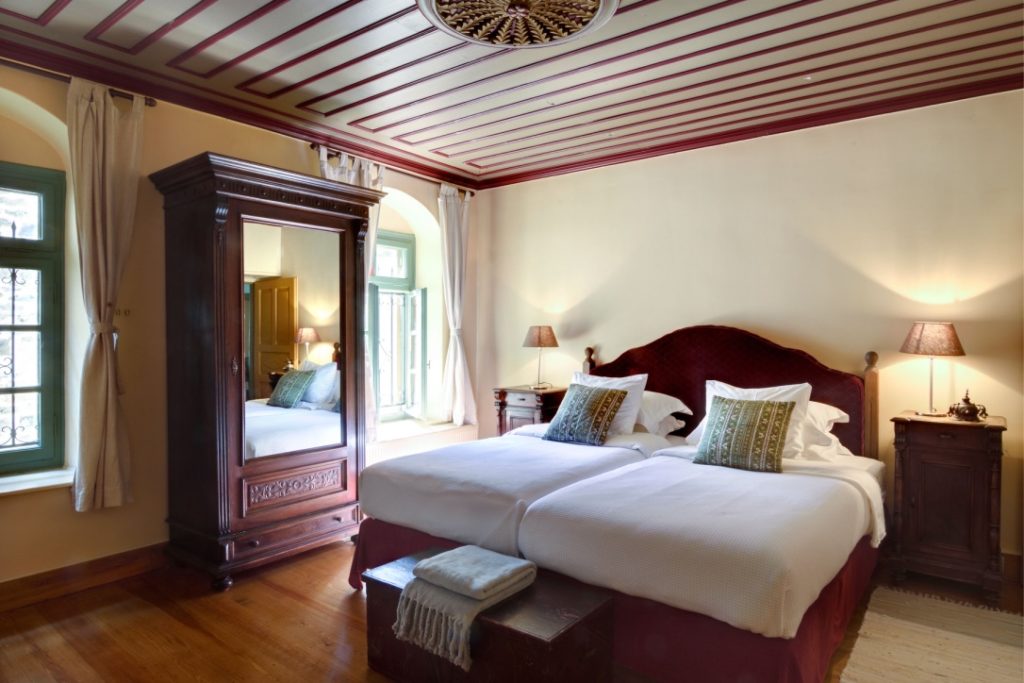
Zagori accommodation
Felice Do you have any tips for cycling, for people coming on your trip for the first time?
Oli Well, okay. I have great quote that really appeals to me and I can’t remember it verbatim, but it’s something like beware any activity that requires new clothes. So it was Henry David Thoreau and I really like that. You don’t need brand new Lycra. It doesn’t mean come scruffy, you can do that if you want to but don’t have to. But it just means you don’t need to buy all the new gear and new Lycra to go on a holiday with us. It’s more about the experience and the people and the places. So that probably gives a good sense of what our trips are like.
And the last thing is that if you’re even considering getting an e-bike if you come on a trip with us, then get one – because you won’t regret it.
Peter Thank you very much for appearing on our travel podcast. We wish you the very best of luck with your Slow Cyclist holidays in the future.
Oli Thank you both.
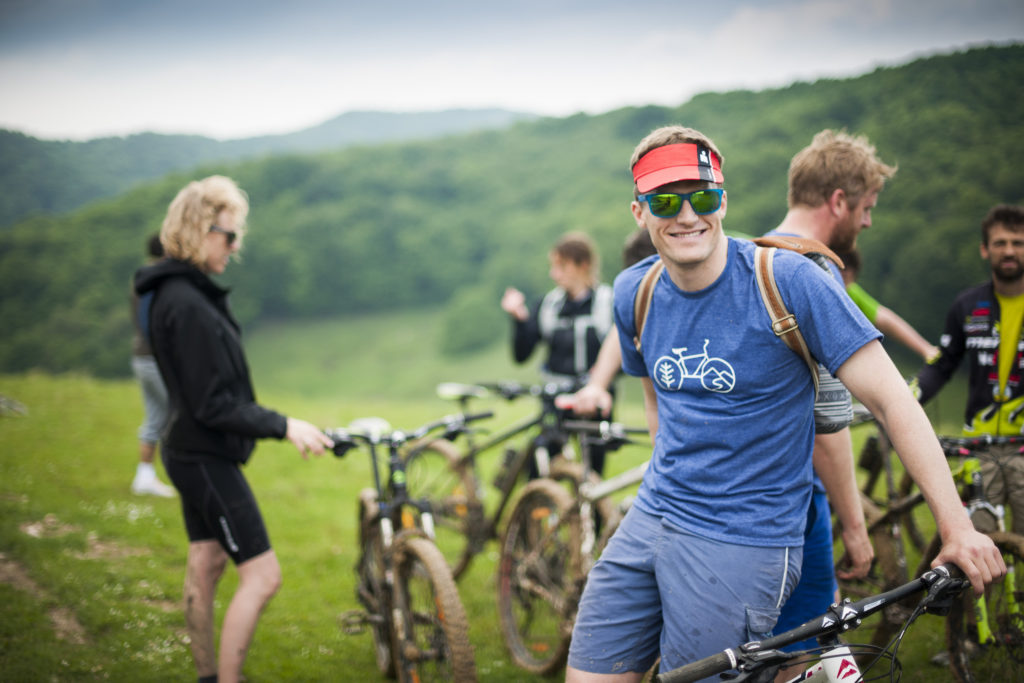
Cycling in Romania. Photo: © Honeybunn Photography
Felice That’s all for now. If you’ve enjoyed the show, please share this episode with at least one other person! Do also subscribe on Spotify, i-Tunes, Stitcher, or any of the many podcast providers – where you can give us a rating. You can also find us on Instagram, Facebook and Twitter. Stay safe and we’ll see you next week.
© ActionPacked Travel
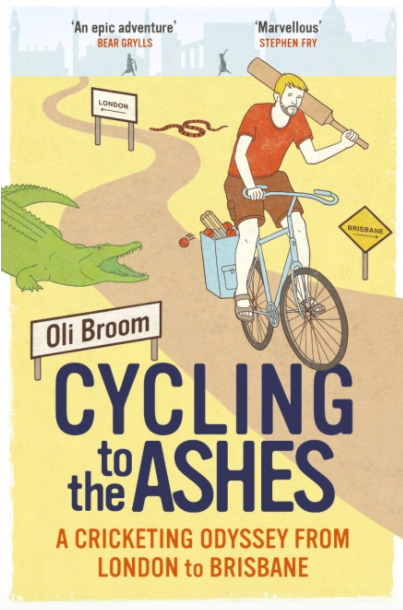
Oli Broome’s book, Cycling to the Ashes: A Cricketing Odyssey From London to Brisbane is available to order from bookshops. Also see Episode no.3: Pedalling The Dream In Southeast Asia.
© Action Packed Travel

- Join over a hundred thousand podcasters already using Buzzsprout to get their message out to the world.
- Following the link lets Buzzsprout know we sent you, gets you a $20 Amazon gift card if you sign up for a paid plan, and helps support our show.
